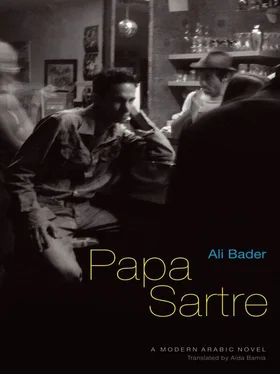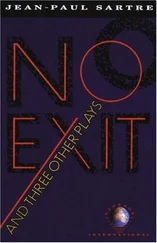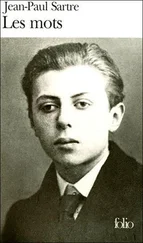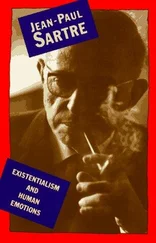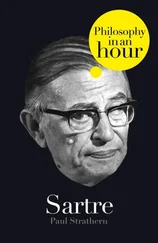Writing freed me of all that because I could give free rein to the emotions the philosopher was unable to express. I revived him, breathed life into him, brought him to the brink of an explosion. By this I don’t mean I wrote a book of history; I always insisted on the danger and futility of an interpretation based on history. No, I made room for imagination and a place for his personality in the biography, filling the gap between the imagined personality and the real subject. What the flesh-and-blood philosopher and the philosopher on paper have in common is the way of life, the environment, and the persons that surround them. I became aware that people live only through their imagined selves, which led me to establish a relationship between words and objects through the imagination of the characters and their delusions. I created a supplementary image in the mind, one that was more anguished in the abstract than it was in reality. It is an image that a work written without sincere concern for the main character cannot include between its covers.
As I said earlier, I was looking at the street from the window, and I saw a woman carrying a bag, a nightingale taking in the cold of the gardens. Then I heard the thin sound of a violin wafting on the fresh air, entering my room through the window, and spreading like a long, well-combed beard.
I drew a bath and jumped into the tub to relax after a strenuous period of work. I closed my eyes and let myself go, enjoying the scent of the salts I had put in the water. Suddenly I heard a noise that sounded as if someone were trying to break into my apartment. The dog was barking, and I was petrified, as if my body had turned into a log floating in the bathwater. I slid out of the tub, put on my bathrobe, and half-opened the door. Hanna Yusif was moving surreptitiously toward my desk. I went out and asked him what he was doing in my apartment. It was a silly question because I knew very well that he was after the philosopher’s biography. He was startled and tried to hide his embarrassment. He laughed loudly, “Oh! You’re here! I didn’t know, forgive me.” When I asked him how he managed to open the door, he pulled a ring of keys from his pocket and said, “I opened it with the key, believe me. I found those keys in my pocket and said to myself, let me try one of them.”
“You should have knocked,” I shouted.
“By Christ, I did knock, but you didn’t hear me. I thought you weren’t at home, and I decided to come in and wait for you,” he explained.
I rejected his excuse, “Hanna, when I am not at home you do not have permission to come in. You know this. It’s simple good manners!”
He continued to defend himself. “I know, but we’re friends— or I thought we were.”
The dog was stretched out near the bed, sweating, his eyes yellowish. His mouth was opening and closing, his teeth were not showing. I was alarmed and went to check his pulse. Hanna said, “Don’t worry. He won’t die. It’s a temporary anesthetic. He’ll come back to his senses in a few minutes.” The dog was moaning and twitching slowly on the floor. I went to my room to get dressed, and when I returned I saw Hanna going through my papers on the table.
I went to the kitchen to make coffee, and I heard Hanna laugh as he was reading the papers. He was more elegant this day than when I first saw him. He carried a silver cane and used it for appearances only. He wore a shiny blazer and a vest with a silver watch in one of the pockets. His hair was well combed, and his cologne filled the space of the room. All this elegance, however, could not hide his depravity and hypocrisy.
I put his coffee on the table, and when I turned to look at him, his hand was shaking. He said to me, “I’ll take these papers home to read.” I objected, “No, Hanna. I have not completed my work yet.”
The truth is that I had made two copies of my biography. One I hid in my clothes closet, and the other was on the desk. I was worried about the future and didn’t trust Hanna Yusif or Sadeq Zadeh. I was able to persuade Hanna to read the papers in my apartment.
I went out to eat breakfast and buy cigarettes and left Hanna in the apartment to read. I hurried back and found him tearing up some of the pages and dumping them in the wastebasket. I shouted at him, “What are you doing!” He explained, “Nothing, some of the information is incorrect, believe me.” He had destroyed all the pages on which I wrote of the suicide of the philosopher but showed a great interest in the activities of Ismail Hadoub. He was more interested in this character than in the others. Laughing indecently, he said he wanted me to provide more dirt about Ismail. His malicious eyes moved from page to page. Finally he agreed, “What you’ve written is enough. Can I take the biography home with me?”
“Yes, you may, once you pay me the agreed upon wage.” But he wasn’t prepared for that.
“I’ll give you your money tomorrow. I didn’t expect you to finish it so soon. Believe me, I’ll pay you tomorrow.” But I insisted and told him that he wouldn’t get the biography before he gave me the money he owed me.
I took great pleasure in tormenting him. He would first beg me to accede to his request, and whenever he failed he’d act as if it didn’t matter to him. He’d seem to give up, “OK, I’ll leave it here then, even though we’ve agreed that I’ll pay you. Don’t worry. I’ll give your money. I can’t deny you your rights. You’ve worked very hard the whole time.”
Then he’d flip the pages and come up with another reason to take the manuscript home, “If you give it to me today I’ll correct some of the historical mistakes and give it back to you for a rewrite, then I could pay you. Once you’re done with the corrections, I’ll come back with Nunu Behar and take the final version.”
I thought to myself, “what’s wrong with giving him this copy? I have another one. I can discover his intentions from the historical corrections he wants to make.” I told him, “All right Hanna, take these papers with you on condition that you return them to me tomorrow with the money.” He could hardly contain himself. He snatched up the manuscript and fairly flew out of the apartment.
I began straightening up my apartment and placing the documents in their place in the cupboard. I discovered that some documents related to Ismail Hadoub’s life had disappeared. Frantic, I looked for them everywhere — under my papers, between the magazines and newspapers, under the bed. I was looking among my clothes when I heard a knock. Sadeq Zadeh and Nunu Behar were at the door. Sadeq pushed me inside and asked, “What did you give Hanna?”
“Nothing,” I said, fully aware of my lie. Sadeq was furious and his eyes were spewing flame.
“Where is the biography?” asked Nunu. I opened my cupboard and gave them the second copy. They leafed through it while I watched, seated beside my dog.
Nunu Behar sat on a chair holding her purse while Sadeq Zadeh read through the philosopher’s biography, commenting volubly. “Not true. I never said that! Liar, liar.” He was swearing and whistling his fury, then turned to me, “Where did you get these documents?”
“Which documents,” I asked, frightened by the tone of his voice.
“The documents related to Ismail Hadoub.” I was silent and nervous. I had never expected Ismail Hadoub’s story to be more important than the philosopher’s. I was commissioned to write a biography of the philosopher not of Ismail Hadoub, and if I included information about him it was because he augmented the image of the philosopher. I said to Sadeq, “But you told me that the most important thing was to write about the philosopher’s life. I don’t understand this sudden interest in Ismail Hadoub.”
Читать дальше
